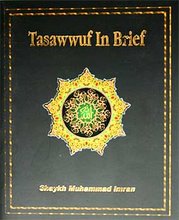Narrated by Abu Hurairah رضي الله عنه : Allah’s Messenger صلي عليه وسلم said,
“A strong believer is better and dearer to Allah than a weak one in all good things. Adhere to that which is most beneficial for you. Keep beseeching Allah for help and do not refrain from it. If you are afflicted in any way, do not say: If I had taken this or that step, it would have resulted into such and such,’ but say only: ‘Allah so determined and did as He willed.’ The word ‘IF’ opens the gates of satanic conduct.” [Muslim]
Respected teacher explained that in this Hadith,
1. Goodness is acknowledged in weak as well as strong because the real Faith is a common feature of both. The one who is stronger is, however, better with Allah for the reason that he is more active and energetic in the matter of noble deeds and performance of ritual prayers, obligatory as well as voluntary.
Further ahead this Hadith is related to either:
A. Physical strength (jismani)
B. Spiritual strength (ruhani)
E.g. When one turns angry and controls his anger is the strongest.
In one Hadith it is mentioned:
“The strong man is not the one who wrestles, but the strong man is in fact the one who controls himself in a fit of rage.” [Muslim]
People are usually impressed by the physical power and strength of somebody. But the real strength of man lies in the fact that he should be able to wrestle his passions in a fit of anger and avoid committing an act for which he may subsequently regret. To control the ego [nafs] is the most difficult and daring deed to achieve. One may be physically powerful, however if one is not spiritually powerful there is no use of that strength and power. Where as if one is spiritually strong even though he is physically weak, Insha-Allah he will still gain great success.
One may say, "I am willing to change my ways of life and strengthen my iman, however i don't seem to get up and do what it takes to revert myself for the better"
Respected Teacher answers this in the most amazing manner.
"Hidayah is from Allah, Allah is the one who decides whether you do such an act or not. Ask Guidance from Allah as well as changing. As we all are in need of Allah's help. We cannot achieve anything without him."
2.This Hadith also ordains that in case of trouble, one should exercise patience and show submission and obedience rather than saying ‘ifs’ and ‘buts’ about it, because it provides Shaytan with a chance to mislead the victim.
It has Allah's hikmah behind it all. May Allah be pleased with my respected and most beloved teacher and May Allah guide us all, Ameen……….



